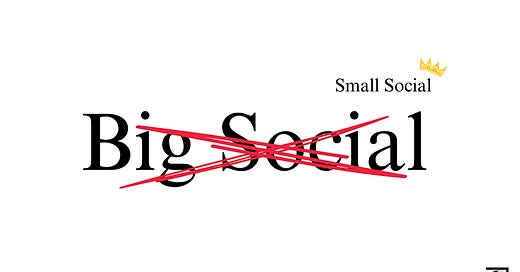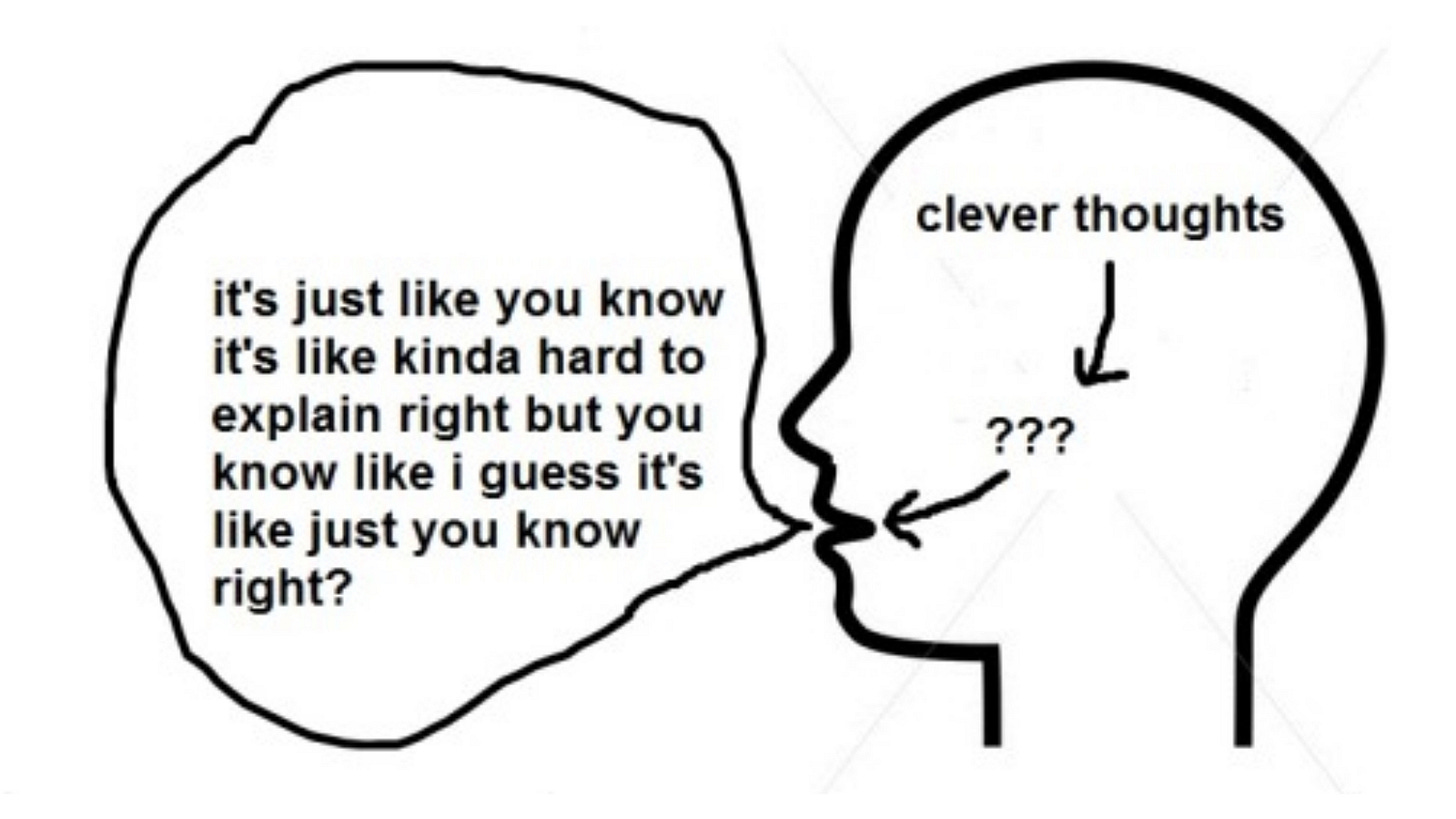The Next Big Frontier is Small Social
Big Social set the stage for ‘Flex Culture,’ but the next wave of social media is more intimate
Business Insider just called social media dead.
Tiktok announced that they're gearing up for a major push into messaging.
Consumers are growing sick and quite honestly, bored of having to be performative to the point of not even wanting to post anymore. That said, it’s making way for the next era of the digital web.
So what’s the next big frontier?
I’d simply call it…
Small Social
The last decade of big social has been a whirlwind of influencers seeking fame, corporations harvesting data, brands buying relevancy, and everybody interacting largely in one place. (Shout out big tech 😎 )
This is great if you’re one of the top 10% of the population with a sizable social media following who get more comments on any given post than anybody has time to read. But for the average person who has below 1,000 followers on any given platform–can end up feeling more like they’re left in the dark.
Not everybody is seeking fame and fortune, and it’s a new dawn for social media platforms to treat humans like humans who seek connections.
With “community” being a major buzzword over the last two years, big tech glazed over the importance of the individual user and their 1-on-1 conversations and interpersonal relationships. Some people are quiet in public settings but perfectly comfortable in small groups.
Of course, this is not just about messaging and small-group dynamics, but a more holistic lens that could include features like better content curation, enhanced privacy controls, and even more advanced artificial intelligence-driven 'social' assistants that can understand context and nuance. Rather than broadcasting your message in a crowded town square, some people just want to have a private conversation away from prying eyes, whether it’s with a human or AI.
The ability to have non-public group conversations will always be important, and it’s easy to underestimate the infinite value of privacy.
Despite all the technological advances, we still have a variety of group chats with family and friends, whether it’s via text or direct messages. We also enjoy moving between groups and communities throughout the day and sometimes like to limit our conversations to specific topics.
It's clear as day that the end user wants more genuine, private interactions. The popularity of apps like Messenger and WhatsApp prove that let alone the value of DMs on any social platform. Both Bluesky and Threads were temporary sensations this year when Twitter/X had major problems. They both failed to keep people on the platform perpetually, and it’s important to note they lacked DMs.
Even when you’re at a crowded business convention, you’ll set aside private rooms for meetings that may contain proprietary information that is not safe to share in public. People don’t always want to make important deals on the show floor. And you may want to talk to your business partners in private about important decisions.
It’s just a matter of how tech companies provide such value by leaning into psychological value.
That said, let’s dive into some bullish use cases I’ve been watching:
1) Hellobot
Hellobot is Korea’s leading AI chatbot and offers thousands of types of fortune-telling content, ranging from horoscopes and Tarot to Korean astrology. The company plans to take the platform global this year. Hellobot also empowers creators to easily build their own chatbots without coding, making the content scalable and adaptable to other platforms. Today, they have 3 million users just in Korea.
These personalized AI chatbots can be the perfect way to socialize without the toxicity that comes with online trolls. No matter how big or small it is, every social platform inevitably attracts trolls, and this can negatively impact your mental well-being. AI chatbots act as a controlled environment that can help calm your nerves and provide comfort without the fear of being brigaded and ratioed by jerks.
2) Tribes
Tribes is a messaging app that introduces a tipping feature that allows users to show appreciation for messages with more than just emojis—by sending money. Integrated seamlessly alongside reactions, the tipping system allows customization, supporting various assets like $ETH, $MATIC, and $USDC, and can be confirmed with a quick biometric or signature for security.
You can now pay your friends tangible capital for giving you a good laugh.
3) Dialect
Dialect.to, another messaging platform, is designed for creators and their fans to introduce a unique feature: collectible chat stickers that you can own in the web3 space. Users can crack open engagement packs to find rare stickers, complete collections, and share them with friends, all while interacting in a chat environment that's seamlessly integrated with the ability to make purchases and engage with creators.
I met the Founder a few weeks ago at the first Solana NYC Alliance event I hosted and he compared their community to streetwear enthusiasts foaming at the mouth over new product drops… except its sticker packs. Similar to the likes of the legacy Supreme has built and rising designer, Antony Riddle, it’s apparent that the crowds have been going wild.
4) Friendly Social Browser
Friendly Social Browser is an all-in-one place for you to access all of your social accounts. There are too many social platforms to track these days, from Telegram and Discord to Twitter, Instagram, TikTok, LinkedIn, and more. Even if the Fediverse takes off, it will only add more networks, and we need one place to log in and navigate them all. This simple solution frees up valuable storage space and resources on your phone while keeping invasive data tracking to a minimum.
Being Social…In Private
I’ve always said that privacy is the ultimate luxury and as younger generations are seeing the long-term impact of their digital footprint, we’re going to see a day of reckoning where the pendulum swings back away from blasting your life publicly for social clout.
Social media has grown to be a performative flex of engagement, when the reality is people just want to be heard and understood. As a user who is on almost every social platform you can think of, the thought of posting on certain platforms like Instagram, just gives me performance anxiety at times, because watching the engagement grow through likes, comments and even that share paper plane is just straight-up anxiety-inducing.
Compared to a sport, the lifestyle you give off can get quite competitive in the modern world. 30–60% of athletes will experience performance anxiety symptoms before or during competition and this can negatively affect their ability to perform.
Sound familiar?
At the end of the day, it's not about how many people you reach, but the quality of those connections. And your DMs on any given platform are more important than the engagement on your public posts.
Because maybe, just maybe, in an age of constant sharing, the most revolutionary act could be choosing what not to share, but with whom you share it with.
Lena Grundhoefer is the Founder of ZEITG3IST, a globally recognized digital marketing and strategy collective. Through future-proof marketing solutions for the brands of tomorrow, we illuminate stories that define our era, championing a world where the fusion of entertainment, Web3 and empowerment becomes our essence of being.












